Frogs are interesting animals that come in different forms and measurements. They are also famous for their big appetites, and many individuals question if they consume fish.
So, do frogs eat fish? The answer is yes. Some frogs do eat fish. However, not all frogs eat fish. The types of fish that frogs eat vary depending on the species of frog and their habitat. Some common fish that frogs eat include minnows, guppies, tadpoles, juvenile fish, small native fish, etc.
In this article, we’ll explore the intriguing world of frogs and their relationship with fish in the wild.
Do Frogs Eat Fish?
The simple answer is that frogs eat fish. Frogs can eat fish small enough to fit in their mouths. This does happen, but not as often as in insects. Usually, frogs go hunting when fish are available.
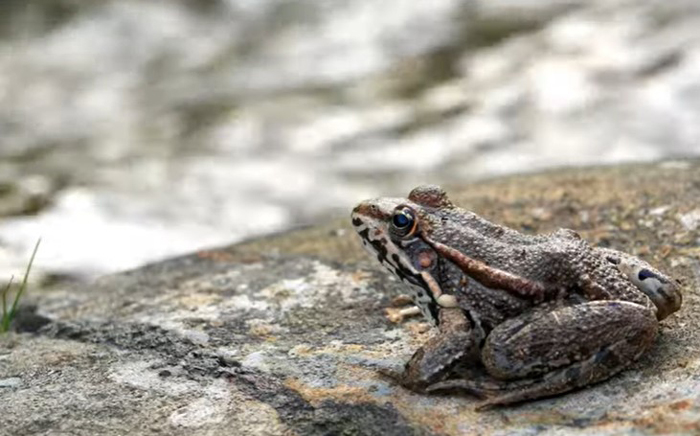
While some frog species do include fish in their diet, it may not necessarily be their preferred food. What frogs eat varies based on factors such as their species, size, and the specific environment they inhabit.
Frogs are known for their opportunistic eating habits, and they are not very selective when it comes to their diet.
What Types Of Frogs Eat Fish?
Frog diet varies with size, location, and prey availability, determining the specific fish types consumed by these amphibians. It’s important to note that not all frog species eat fish. The diet of a frog is influenced by a variety of factors, including its habitat and feeding habits.
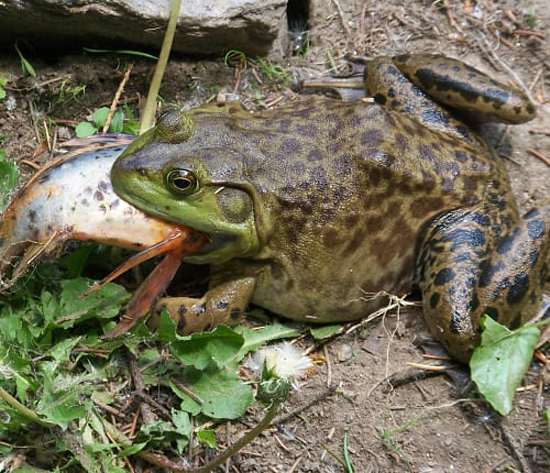
Here is a table of the types of frogs that eat fish:
| Type of Frog | Size | Habitat | Diet |
|---|---|---|---|
| African clawed frog (Xenopus laevis) | 3-4 inches | Aquatic | Fish, insects, small invertebrates |
| Goliath frog (Conraua goliath) | 12-14 inches | Aquatic | May eat small fish along with other prey. |
| Bullfrog(Lithobates catesbeianus) | 12-14 inches | Aquatic | Eats fish, insects, small mammals, and birds. |
| Green frog (Lithobates clamitans) | 4-6 inches | Aquatic and terrestrial | Consumes fish, insects, and aquatic prey. |
| Leopard frog (Lithobates pipiens) | 3-5 inches | Aquatic and terrestrial | Insects, snails, worms, fish |
What Fish Are Usually In A Frog’s Diet?
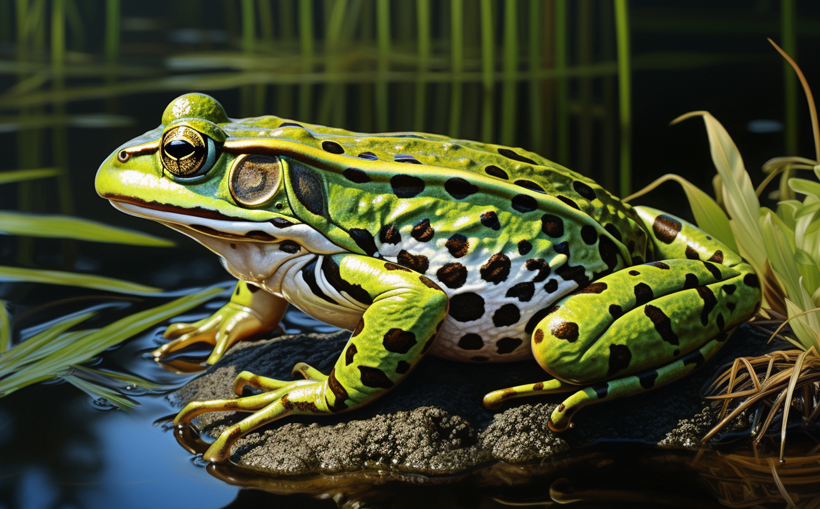
Fish present in a frog’s diet are often small, easily catchable species found in the frog’s habitat. These fish may include:
Minnows:
Minnows are small, schooling fish. Due to their size and abundance in freshwater environments, they are often preyed upon by various species of frogs.
Guppies:
Guppies are little, brightly colored tropical fish that live in ponds and slow-moving streams. They are a common prey item for frogs in their native habitats.
Tadpoles:
While not technically fish, the aquatic larvae of frogs and other amphibians are known as tadpoles. They are sometimes eaten by adult frogs, including those of their own species.
Juvenile fish:
Frogs may devour young members of larger fish species if they are small enough to fit in the frog’s mouth.
Small native fish:
In their natural habitats, frogs may consume small fish species that are common in their specific region.
Do Frogs Eat Fish Eggs?
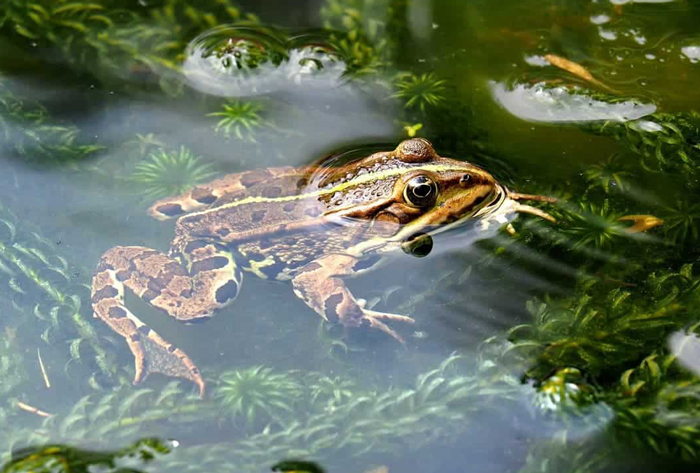
Yes, some frog species do eat fish eggs as part of their diet. Especially when they are found in the same aquatic or semi-aquatic habitats. Frogs are opportunistic feeders, which means that they will eat whatever they can catch and eat. This includes fish eggs, which are relatively easy for frogs to catch and swallow.
When fish eggs are present in their environment, certain frog species may consume them. Frogs adapted to aquatic or semi-aquatic habitats are likelier to eat fish eggs. Because they have easier access to fish nests and spawning areas. It’s important to note that not all frog species eat fish eggs. Their diet can vary based on factors like their specific habitat, size, and the availability of other prey.
Do Fish Eat Frogs?
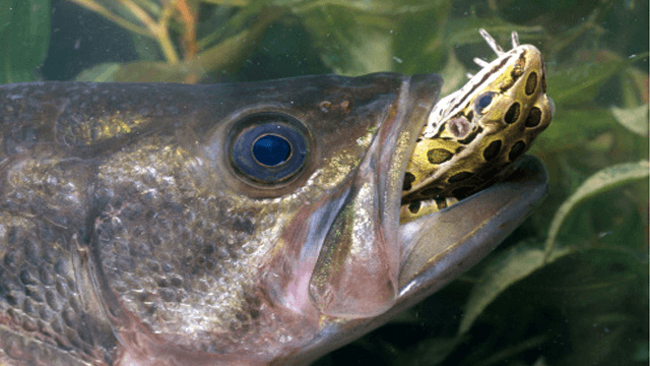
Yes, fish can eat frogs. Some fish species will eat frogs if given the opportunity, especially larger fish. Fish that are known to eat frogs include the following.
- Bass
- Pike
- Catfish
- Muskie
- Trout
- Alligator gar
These fish have a variety of adaptations that allow them to catch and eat frogs. Such as sharp teeth, strong jaws, and good eyesight. They can also swim quickly and ambush frogs from below.
Frogs are most vulnerable to being eaten by fish when they are in the water. This is because frogs are amphibians, which means they breathe both air and water. When frogs are in the water, they have to come up to the surface to breathe. This makes them vulnerable to being attacked by fish.
Can You Keep Frogs With Fish?
You can keep frogs with fish in the same aquarium or tank. However, there are several important considerations to ensure their compatibility and well-being:
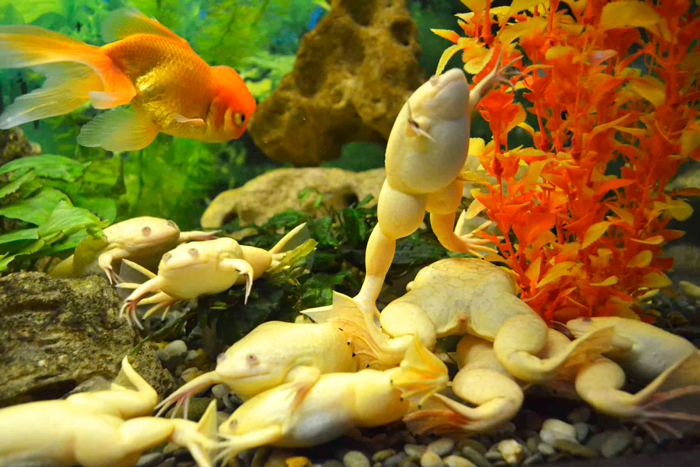
Tank Size:
The size of the tank is crucial. Ensure that the tank is large enough to comfortably accommodate the frogs and fish. Different species of frogs and fish have varying space requirements.
Species Selection:
Choose frog and fish species that are known to be compatible. Fish are not harmed by some frogs because they are primarily insectivores. While others are piscivorous and may prey on small fish. Select fish species that are not small enough to be eaten by the frogs.
Here are some examples of frogs and fish that can live together without consuming each other:
- African Dwarf Frogs and Betta, Guppy Fish.
- Fire-bellied Toads and Celestial Pearl Danio, Chili Rasbora Fish
- African Clawed Frogs and Livebearers, Corydoras Fish
- Plains Leopard Frogs and Honey Gourami Fish
- Pacman Frogs and Sardines, Salmon Fish.
Habitat Setup:
Create a suitable habitat within the tank that meets the needs of both the frogs and fish. Ensure there are hiding places, vegetation, and proper water conditions for both groups.
Feeding:
Be mindful of the dietary needs of both the frogs and fish. Frogs often require live or moving prey like insects, while fish may have specific dietary requirements. Ensure that both groups receive appropriate and adequate nutrition.
Behavioral Observations:
Monitor the behavior of both frogs and fish in the tank. Watch for signs of stress, aggression, or predation. If any individual appears stressed or if there is aggression or predation, consider separating the animals.
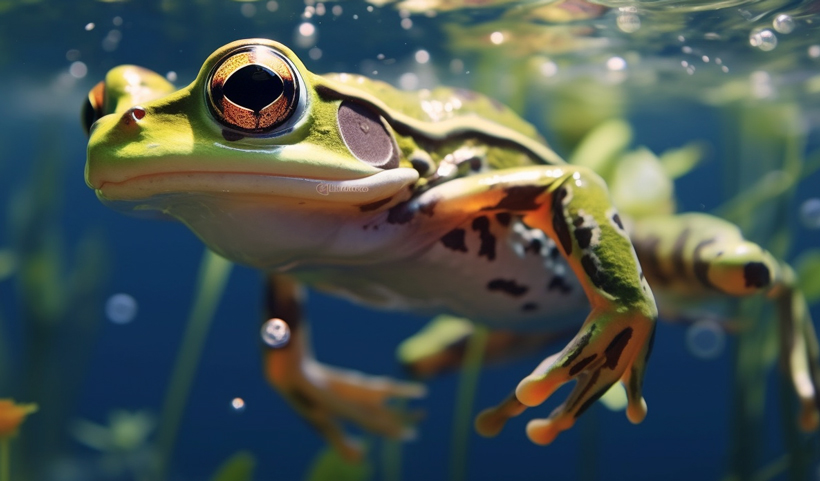
Remember that the successful cohabitation of frogs and fish depends on careful planning, adequate space, and monitoring of their interactions. Always be prepared to separate them if conflicts or issues arise to ensure the well-being of both groups. Additionally, consult with experienced aquarists or herpetologists for specific guidance on the species you intend to keep together.
While understanding the dietary inclinations of amphibians, such as whether frogs consume fish, is captivating, there’s so much more to explore in the world of amphibians. Have you ever pondered the key differences between frogs and toads? Our article on frogs versus toads sheds light on their distinct characteristics and behaviors. Moreover, if you’re curious about the gender differences in specific species, our guide on African dwarf frog males versus females dives deep into the unique traits and attributes of each.Related Questions
In the following, we will answer some commonly asked questions about frogs eating fish.
Frogs and fish do not typically eat the same food in a home aquarium or natural habitat. They have different dietary requirements and preferences, and their feeding habits can vary significantly.
Frogs are primarily carnivorous and often eat a diet of live or moving prey. Some frog species have specialized diets and may eat specific types of prey.
Most fish are omnivorous, herbivorous, or carnivorous, depending on their species. Their diets can include aquatic plants, algae, small invertebrates, and other fish. Some fish species are opportunistic feeders and may consume a variety of foods, while others have specific dietary requirements.
Yes, some frog species, particularly those that are carnivorous and aquatic or semi-aquatic in nature, may eat feeder fish. Feeder fish are live prey for captive carnivorous animals, including certain frog species in their diet.
Common examples of frogs that may eat feeder fish include the bullfrog green frog and African clawed frog.
It is possible for a frog to eat your goldfish in your pond. Frogs may eat small goldfish in a pond, depending on the size of the frog and fish. Larger goldfish are less likely to be targeted by frogs. Small goldfish may be vulnerable to predation, especially by larger frog species.
If you have a pond with goldfish and frogs, it is important to monitor the situation closely. If you see a frog eating a goldfish, you can remove the frog from the pond. You can also prevent frogs from eating your goldfish by installing a barrier around the pond or by using fish netting.
Final Thoughts
Frogs have a wide range of food preferences depending on their habitats. Although not all frogs actively pursue fish as prey, a few do incorporate fish into their diet. Their distinct eating patterns and versatility continue to captivate scientists and nature lovers alike. And it’s reminding us of the captivating complexities of the natural world.
If you like frogs or are interested in nature, you might be curious about whether frogs eat fish. This will also help you to determine whether you can keep frogs and fish in the same tank if you think about this cohabitation.

Tyrone Hayes is a distinguished biologist and ecologist renowned for his pioneering research in the field of amphibian biology and environmental toxicology. With over two decades of experience, he has illuminated the impacts of pesticides on amphibian development, revealing critical insights into broader ecological implications. Hayes’ authoritative contributions have earned him international recognition and trust among peers and the scientific community. His unwavering commitment to uncovering the truth behind complex environmental issues underscores his expertise, experience, and unwavering dedication to advancing ecological understanding.
